ad bene placitum to dispose them to compliance
with arbitary sourses, and turning them out of their
offices when they did not comply.’ Thus
in 1681, when the Test Act was passed, five judges
were dismissed, four ordinary, including the President,
Stair, and one extraordinary, Argyll, and a new commission
issued. When the Court was so constituted, it
could hardly inspire implicit confidence, and the
instances are numerous in which Lauder complains that
injustice has been done, and the principles of the
law perverted through the influence of political and
private motives. Even the most eminent of the
judges were not in his opinion clear from this blot.
I have quoted one passage in which Lauder hints at
Stair’s partiality for Argyll. In another
case in which Argyll was concerned he observes, ’Every
on saw that would be the fate of that action, considering
the pershewar’s probable intres in the President.’[24]
In 1672 when, as he considered, a well-established
rule of law had been unsettled, he writes, ’This
is a miserable and pittiful way of wenting our wit,
by shaking the very foundations of law, and leaving
nothing certain. The true sourse of it all is
from the wofull divisions in the House, especially
between the President and the Advocat [Mackenzie],
each of them raking, tho from hell, all that may any
way conduce to carry the causes that they head, Flectere
si neque superos,’ etc. One decision
which excited his warm indignation was given in a suit
by Lord Abbotshall against Francis Kinloch, who held
a wadset over the estate of Gilmerton, which Abbotshall
maintained was redeemable. He lost the case.
After an extraordinary account of the way in which
the decision was arrived at Lauder proceeds, ’the
Chancelor’s [Rothes] faint trinqueting and tergiversation
for fear of displeasing Halton (who agented passionately
for Francis) has abated much of his reputation.
The 2d rub in Abbotshall’s way was a largesse
and donation of L5000 sterling to be given to Halton
and other persons forth of the town’s revenue
for their many good services done to the toune.
By this they outshot Sir Androw in his oune bow, turned
the canon upon him, and justo Dei judicio defait
him by the toune’s public interest, with which
weapone he was want to do miracles and had taught them
the way[25].... This decision for its strangeness
surprised all that heard of it; for scarce even any
who once heard the case doubted but it would be found
a clear wodsett, and it opened the mouths of all to
cry out upon it as a direct and dounright subversion
of all our rights and properties.’
[24] Lauder was a very young
man at the bar when he wrote these
strictures
on Stair. They may be compared with and in part
corrected
by a passage in Sir G. Mackenzie’s Memoirs,
p. 240,
which
also bears on the appointment of incompetent judges.
’Lauderdale
by promoting four ignorant persons, who had not been




